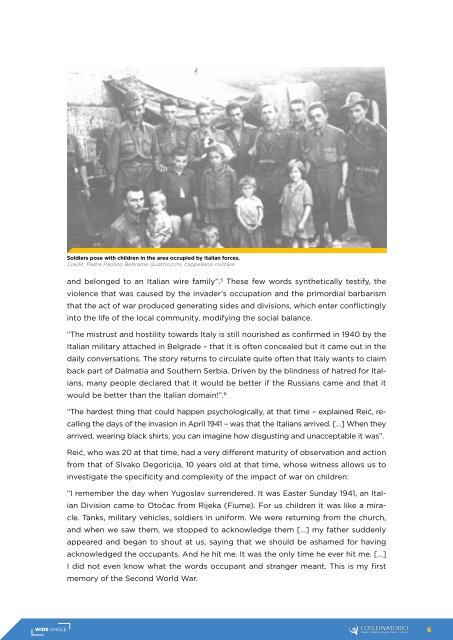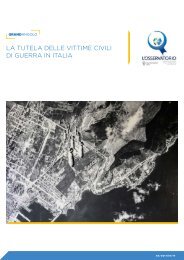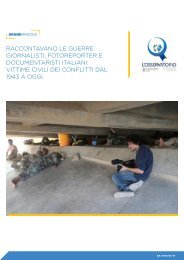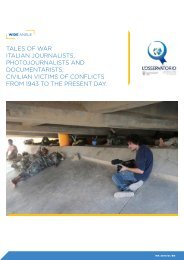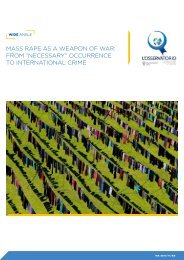The Horror in the Balkans. Civilian Victims in the Second World War in the Former Yugoslavia
You also want an ePaper? Increase the reach of your titles
YUMPU automatically turns print PDFs into web optimized ePapers that Google loves.
Soldiers pose with children <strong>in</strong> <strong>the</strong> area occupied by Italian forces.<br />
Credit: Padre Paol<strong>in</strong>o Beltrame Quattrocchi, cappellano militare.<br />
and belonged to an Italian wire family”. 5 <strong>The</strong>se few words syn<strong>the</strong>tically testify, <strong>the</strong><br />
violence that was caused by <strong>the</strong> <strong>in</strong>vader’s occupation and <strong>the</strong> primordial barbarism<br />
that <strong>the</strong> act of war produced generat<strong>in</strong>g sides and divisions, which enter conflict<strong>in</strong>gly<br />
<strong>in</strong>to <strong>the</strong> life of <strong>the</strong> local community, modify<strong>in</strong>g <strong>the</strong> social balance.<br />
“<strong>The</strong> mistrust and hostility towards Italy is still nourished as confirmed <strong>in</strong> 1940 by <strong>the</strong><br />
Italian military attached <strong>in</strong> Belgrade – that it is often concealed but it came out <strong>in</strong> <strong>the</strong><br />
daily conversations. <strong>The</strong> story returns to circulate quite often that Italy wants to claim<br />
back part of Dalmatia and Sou<strong>the</strong>rn Serbia. Driven by <strong>the</strong> bl<strong>in</strong>dness of hatred for Italians,<br />
many people declared that it would be better if <strong>the</strong> Russians came and that it<br />
would be better than <strong>the</strong> Italian doma<strong>in</strong>!”. 6<br />
“<strong>The</strong> hardest th<strong>in</strong>g that could happen psychologically, at that time – expla<strong>in</strong>ed Reić, recall<strong>in</strong>g<br />
<strong>the</strong> days of <strong>the</strong> <strong>in</strong>vasion <strong>in</strong> April 1941 – was that <strong>the</strong> Italians arrived. […] When <strong>the</strong>y<br />
arrived, wear<strong>in</strong>g black shirts, you can imag<strong>in</strong>e how disgust<strong>in</strong>g and unacceptable it was”.<br />
Reić, who was 20 at that time, had a very different maturity of observation and action<br />
from that of Slvako Degoricija, 10 years old at that time, whose witness allows us to<br />
<strong>in</strong>vestigate <strong>the</strong> specificity and complexity of <strong>the</strong> impact of war on children:<br />
“I remember <strong>the</strong> day when Yugoslav surrendered. It was Easter Sunday 1941, an Italian<br />
Division came to Otočac from Rijeka (Fiume). For us children it was like a miracle.<br />
Tanks, military vehicles, soldiers <strong>in</strong> uniform. We were return<strong>in</strong>g from <strong>the</strong> church,<br />
and when we saw <strong>the</strong>m, we stopped to acknowledge <strong>the</strong>m […] my fa<strong>the</strong>r suddenly<br />
appeared and began to shout at us, say<strong>in</strong>g that we should be ashamed for hav<strong>in</strong>g<br />
acknowledged <strong>the</strong> occupants. And he hit me. It was <strong>the</strong> only time he ever hit me. […]<br />
I did not even know what <strong>the</strong> words occupant and stranger meant. This is my first<br />
memory of <strong>the</strong> <strong>Second</strong> <strong>World</strong> <strong>War</strong>.<br />
6


